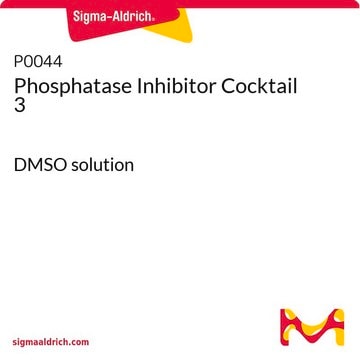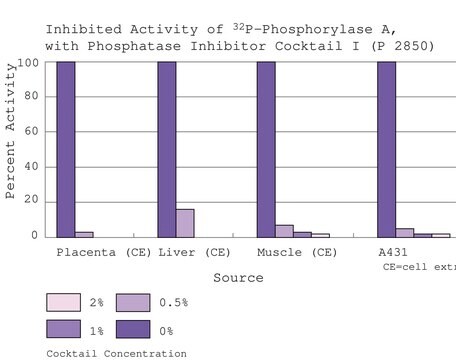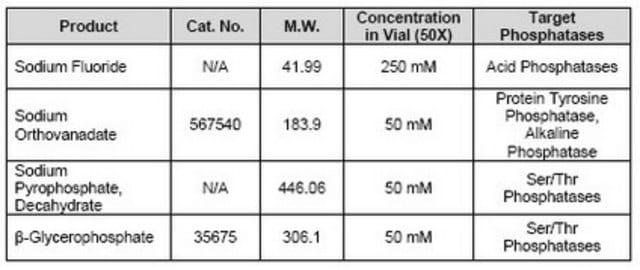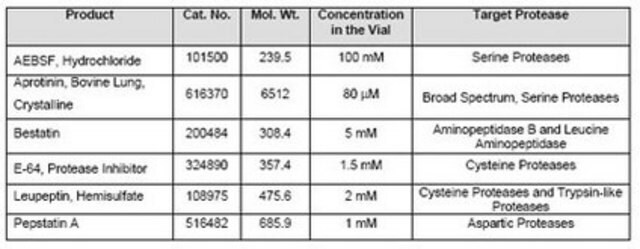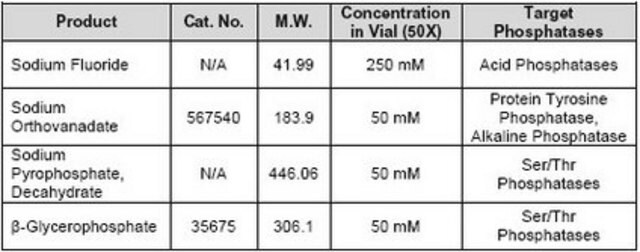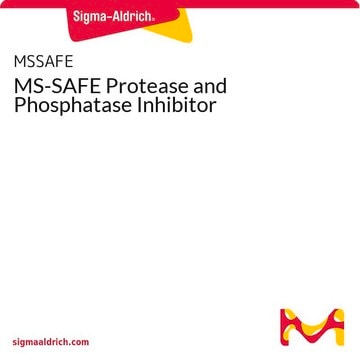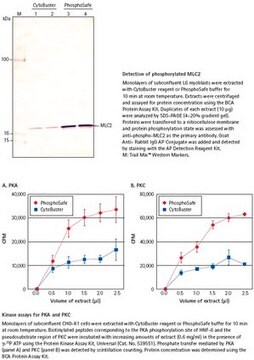524625
Phosphatase Inhibitor Cocktail II
liquid, for the inhibition of acid phosphatases, alkaline phosphatases and protein tyrosine phosphatases (PTP's). Suitable for use with cell lysates and tissue extracts.
Synonym(s):
Phosphatase Inhibitor, Phosphatase Inhibitor Solution (Set II)
About This Item
Recommended Products
product name
Phosphatase Inhibitor Cocktail Set II, A cocktail of five phosphatase inhibitors for the inhibition of acid and alkaline phosphatases as well as protein tyrosine phosphatases (PTPs). Suitable for use with cell lysates and tissue extracts.
Quality Level
form
liquid
manufacturer/tradename
Calbiochem®
storage condition
OK to freeze
shipped in
wet ice
storage temp.
−20°C
General description
Application
- in triple detergent buffer to lyse cultured cells to extract total protein for western blots
- as a component of lysis buffer to lyse tissue samples or cultured rat ventricular cardiomyocytes (VCMs) for western blot analysis of cardiac mitochondrial proteins
- as a component of lysis buffer to lyse cultured rat VCMs infected with Adv-COX7RP and Adv-shRNA COX7RP for immunoprecipitation of ryanodine receptors type 2 (RyR2)
- as a component in ice-cold RIPA buffer to homogenize/lyse retina tissues for protein extraction and western blotting
Biochem/physiol Actions
Features and Benefits
- Flexible: compatible with cell lysates and tissue extracts, including samples containing detergents.
- Economical: ready-to-use format minimizes wastage.
- Effective: one ml is adequate for approximately 100 ml extraction buffer.
- Complete: contains five phosphatase inhibitors targeting acid and alkaline phosphatases and protein tyrosine phosphatases (PTPs).
Components
- Imidazole (200 mM)
- Sodium Fluoride (100 mM)
- Sodium Molybdate (115 mM)
- Sodium Orthovanadate (100 mM)
- Sodium Tartrate Dihydrate (400 mM)
Warning
Other Notes
Legal Information
Signal Word
Danger
Hazard Statements
Precautionary Statements
Hazard Classifications
Eye Irrit. 2 - Repr. 1B - Skin Irrit. 2
Storage Class Code
6.1D - Non-combustible acute toxic Cat.3 / toxic hazardous materials or hazardous materials causing chronic effects
WGK
WGK 2
Flash Point(F)
Not applicable
Flash Point(C)
Not applicable
Regulatory Listings
Regulatory Listings are mainly provided for chemical products. Only limited information can be provided here for non-chemical products. No entry means none of the components are listed. It is the user’s obligation to ensure the safe and legal use of the product.
PRTR
Class I Designated Chemical Substances
ISHL Indicated Name
Substances Subject to be Indicated Names
ISHL Notified Names
Substances Subject to be Notified Names
JAN Code
524625-1.0ML:
524625-1EA:
524625-10ML:
524625-100ML:
524625-1SET:
Certificates of Analysis (COA)
Search for Certificates of Analysis (COA) by entering the products Lot/Batch Number. Lot and Batch Numbers can be found on a product’s label following the words ‘Lot’ or ‘Batch’.
Already Own This Product?
Find documentation for the products that you have recently purchased in the Document Library.
Customers Also Viewed
Our team of scientists has experience in all areas of research including Life Science, Material Science, Chemical Synthesis, Chromatography, Analytical and many others.
Contact Technical Service